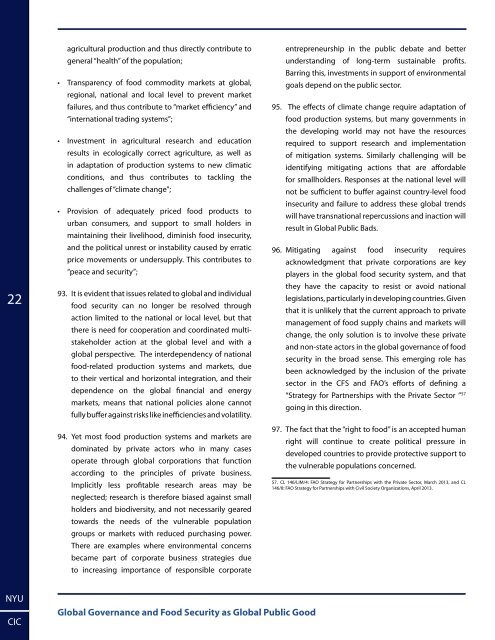Global Governance and Food Security as Global Public Good
Global Governance and Food Security as Global Public Good
Global Governance and Food Security as Global Public Good
You also want an ePaper? Increase the reach of your titles
YUMPU automatically turns print PDFs into web optimized ePapers that Google loves.
22agricultural production <strong>and</strong> thus directly contribute togeneral “health” of the population;• Transparency of food commodity markets at global,regional, national <strong>and</strong> local level to prevent marketfailures, <strong>and</strong> thus contribute to “market efficiency” <strong>and</strong>“international trading systems”;• Investment in agricultural research <strong>and</strong> educationresults in ecologically correct agriculture, <strong>as</strong> well <strong>as</strong>in adaptation of production systems to new climaticconditions, <strong>and</strong> thus contributes to tackling thechallenges of “climate change”;• Provision of adequately priced food products tourban consumers, <strong>and</strong> support to small holders inmaintaining their livelihood, diminish food insecurity,<strong>and</strong> the political unrest or instability caused by erraticprice movements or undersupply. This contributes to“peace <strong>and</strong> security”;93. It is evident that issues related to global <strong>and</strong> individualfood security can no longer be resolved throughaction limited to the national or local level, but thatthere is need for cooperation <strong>and</strong> coordinated multistakeholderaction at the global level <strong>and</strong> with aglobal perspective. The interdependency of nationalfood-related production systems <strong>and</strong> markets, dueto their vertical <strong>and</strong> horizontal integration, <strong>and</strong> theirdependence on the global financial <strong>and</strong> energymarkets, means that national policies alone cannotfully buffer against risks like inefficiencies <strong>and</strong> volatility.94. Yet most food production systems <strong>and</strong> markets aredominated by private actors who in many c<strong>as</strong>esoperate through global corporations that functionaccording to the principles of private business.Implicitly less profitable research are<strong>as</strong> may beneglected; research is therefore bi<strong>as</strong>ed against smallholders <strong>and</strong> biodiversity, <strong>and</strong> not necessarily gearedtowards the needs of the vulnerable populationgroups or markets with reduced purch<strong>as</strong>ing power.There are examples where environmental concernsbecame part of corporate business strategies dueto incre<strong>as</strong>ing importance of responsible corporateentrepreneurship in the public debate <strong>and</strong> betterunderst<strong>and</strong>ing of long-term sustainable profits.Barring this, investments in support of environmentalgoals depend on the public sector.95. The effects of climate change require adaptation offood production systems, but many governments inthe developing world may not have the resourcesrequired to support research <strong>and</strong> implementationof mitigation systems. Similarly challenging will beidentifying mitigating actions that are affordablefor smallholders. Responses at the national level willnot be sufficient to buffer against country-level foodinsecurity <strong>and</strong> failure to address these global trendswill have transnational repercussions <strong>and</strong> inaction willresult in <strong>Global</strong> <strong>Public</strong> Bads.96. Mitigating against food insecurity requiresacknowledgment that private corporations are keyplayers in the global food security system, <strong>and</strong> thatthey have the capacity to resist or avoid nationallegislations, particularly in developing countries. Giventhat it is unlikely that the current approach to privatemanagement of food supply chains <strong>and</strong> markets willchange, the only solution is to involve these private<strong>and</strong> non-state actors in the global governance of foodsecurity in the broad sense. This emerging role h<strong>as</strong>been acknowledged by the inclusion of the privatesector in the CFS <strong>and</strong> FAO’s efforts of defining a“Strategy for Partnerships with the Private Sector ” 57going in this direction.97. The fact that the “right to food” is an accepted humanright will continue to create political pressure indeveloped countries to provide protective support tothe vulnerable populations concerned.57. CL 146/LIM/4: FAO Strategy for Partnerships with the Private Sector, March 2013, <strong>and</strong> CL146/8: FAO Strategy for Partnerships with Civil Society Organizations, April 2013.NYUCIC<strong>Global</strong> <strong>Governance</strong> <strong>and</strong> <strong>Food</strong> <strong>Security</strong> <strong>as</strong> <strong>Global</strong> <strong>Public</strong> <strong>Good</strong>
















